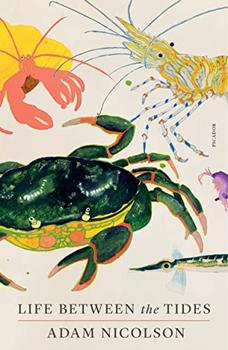Summary | Excerpt | Reviews | Beyond the Book | Readalikes | Genres & Themes | Author Bio

A flicker-spotted fish glides past, sweeping its fins back and forth as it goes, spreading them in half-made, embryonic fan-wings, and then landing in the mud at my feet, the fish itself slowly reappearing from the dispersing cloud and puff of sand its arrival cast up. I photograph it – half in the shadow of my phone, half in light.
A little juvenile dab, three inches from nose to tail, slides along the sea floor beside me, a ripple in every pore, moulding its body Low tide and the serrated wrack on the beach at the head of the bay. to the contours of the sand as if wedded to them, as close as possible to that miniature landscape, a creature as liquid as the sea itself, a film of life, but which, as it pauses, turns invisible, mottled like its surroundings, its greyness speckled with white, banking on a principle opposite to the hermit crab beside it: one almost stupidly visible but dressed in borrowed armour; the other soft, subtle and discreet, the diplomat of this half-world, unseen to the heron that stands now a hundred yards away from me, waiting intently and anxiously, ever-ready to bid.
In the ebbing tide, little fleets of grey, white and black shrimps suddenly appear – they are Crangon crangon, called brown shrimps but they are far from brown – hundreds of them, making their steady soldierly progress over the sea floor, spotted and marbled with the same mixture of white and brown dots as the sand, following the water as it goes, bounce-swimming, antennae alert, settling for a moment on their toe-tips beside me, tails spread behind them in painted fans, all of them heading out to sea away from the warming shallows. Nothing is coming the other way; only with the next tide will the inhabitants of the beach return.
I push a little further out towards the headland on the edge of the bay. The kelp fronds here come up above the water as if they were the fins of dead fish. Their outer tips are broken and beaten by storms. Beneath their dark canopy is a graveyard of ex-lives, of smashed and abandoned shells, a recycling centre for the whole intertidal. Primitive colonies of tiny animals – sea mats – make hieroglyphs and diagrams in lobed and scratched patterns on the sheeny leather of the fronds. In the air the sea mats are glamorous but inert. Push them underwater and within a moment they flicker into magical, frondy, animal life.
In the shade of these weeds, the most unlikely drawing-room colours erupt on a damp Scottish coastline. The coralline makes a vermilion mat where the limpets dig their nests. Venetianstriped top shells crawl between the dried-blood red of the beadlet anemones. Bright yellow and green sponges line the polychrome pools.
All this aquarium life becomes visible if you pull the overhanging weeds away but put your head in under the enormous, jungly, slimed canopy of the kelp and you find yourself in a different country: threatening, shadowed, dark and even haunted where pink fleshy starfish wear ghost-blue lines down each of their arms; where the purple-black dahlia heads of their tentacled mouths are all that can be seen of giant anemones half-buried in the bowls of sand. And where in these shadows, the king and dominator of this world, the green crab, blotched and mottled, with a whole night sky of spots and patches on his carapace, emerges as the terror-giant of a miniature, barnacled world.
There is a line from a Gaelic love song, written in Mull just across the water: 'Cha tàinig tràigh, gun muir-làn na dèidh' ('A low tide never came that wasn't followed by a high tide'). Every ebb implies a flood, in a language where the word for ebb – tràigh – is the same as the word for beach. You will not find a beach without the promise of a rising tide. You may not love me now but love will come one day. An ebb tide is only a full tide in waiting. Trust your life to the turnings of the sea.
Excerpted from Life Between the Tides by Adam Nicolson. Published by Farrar, Straus and Giroux. Copyright © 2021 by Adam Nicolson. All rights reserved.




To win without risk is to triumph without glory
Click Here to find out who said this, as well as discovering other famous literary quotes!
Your guide toexceptional books
BookBrowse seeks out and recommends the best in contemporary fiction and nonfiction—books that not only engage and entertain but also deepen our understanding of ourselves and the world around us.